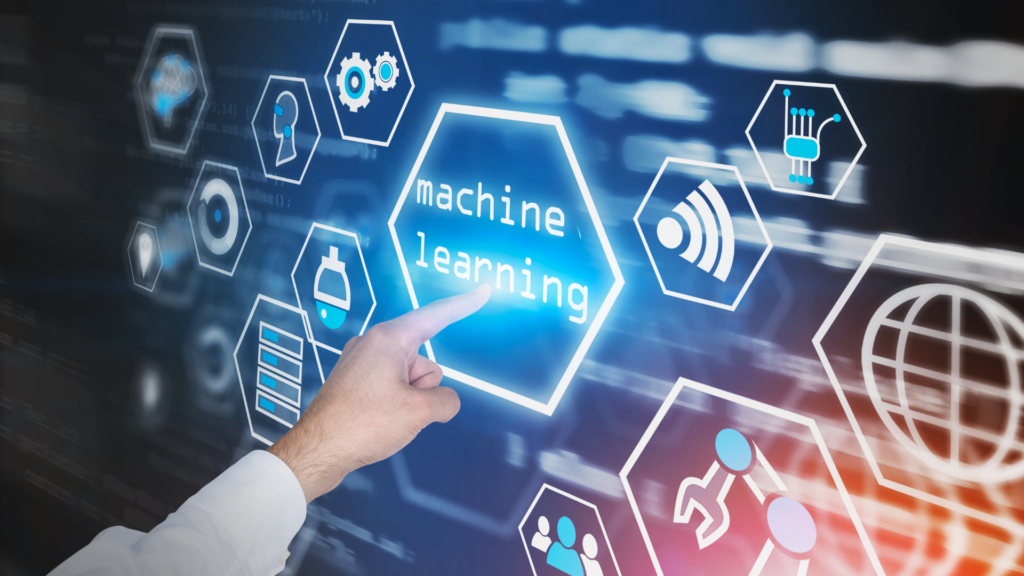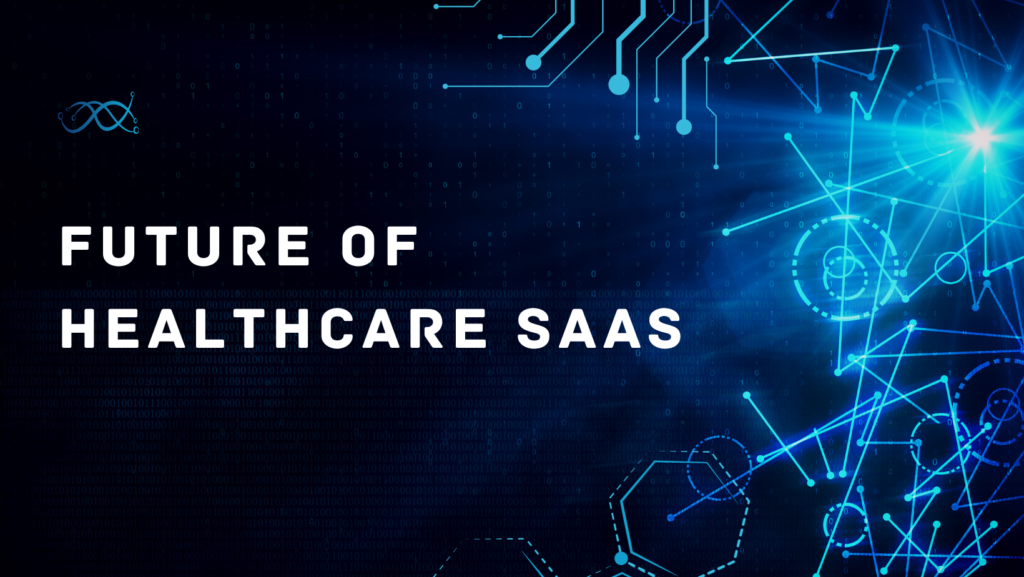How is Machine Learning Used in Healthcare?
Machine learning is catalyzing substantial improvements in the healthcare sector, accelerating progress in critical areas such as clinical operations, drug discovery, and surgery. Notably, machine learning in healthcare excels at detecting early indicators of diseases with greater accuracy, thereby contributing to the reduction of hospital and clinic admissions and readmissions.

Utilizing satellite data, social media reports, news, and video sources, the technology assesses whether a medical condition is manageable or has the potential to become life-threatening. Machine learning in healthcare introduces a realm of boundless possibilities, liberating medical professionals to focus on devising optimal treatment plans and delivering patient care, rather than being preoccupied with data management.
Related Article: How is Artificial Intelligence Transforming the Healthcare Industry
Top Applications of Machine Learning in Healthcare
From optimizing hospital operations to ensuring precise diagnoses, the impact of machine learning in healthcare has proven to be advantageous for both medical professionals and patients. Highlighting various significant applications, machine learning is reshaping the healthcare industry and paving the way for an improved future for patients.
Personalized Treatment
Utilizing machine learning in healthcare is instrumental in tailoring treatments to individual patients, a pivotal application in the field. By examining patients’ medical records, symptoms, and test results, healthcare organizations can provide personalized care. Doctors can leverage machine learning to craft individualized treatment plans, prescribing medications that specifically address the unique characteristics of each patient’s disease.
Fraud Detection and Prevention
Leveraging machine learning in healthcare enables organizations to identify fraudulent insurance claims proactively, preventing unauthorized payments and expediting the approval, processing, and payment of legitimate claims. In addition to fraud detection, the application of machine learning also serves to thwart the theft of patient data.
Detecting Diseases in Early Stages
Identifying numerous diseases in their early stages is crucial for healthcare providers to determine optimal treatment strategies and enhance patients’ quality of life. Machine learning plays a vital role in supporting doctors by analyzing new data in comparison to historical data related to specific ailments. Through this data-driven comparison, healthcare professionals can make informed decisions and tailor effective treatment plans for their patients.
Automating Image Diagnosis
Healthcare facilities, including hospitals and clinics, employ machine learning for the identification of irregularities in medical images, such as those obtained from MRI or radiology scans managed through a radiology information system. Image recognition aids physicians in diagnosing conditions like liver and kidney infections, detecting tumors, enhancing cancer prognosis, and addressing various medical concerns.
What are the Benefits of ML in Healthcare?
Machine learning finds application in a diverse array of healthcare scenarios, including aiding physicians in early disease detection, researching pharmaceuticals, crafting personalized treatment regimens, saving lives, cost reduction, and more. The significance of machine learning in healthcare is far-reaching, encompassing a multitude of major benefits.
Faster Data Collection
The healthcare sector utilizes IoT-connected medical devices to collect real-time data, a task efficiently processed and adjusted by machine learning. This is why the US Food and Drug Administration (FDA) actively incorporates AI and ML into medical device software.
Cost-Efficient Process
The implementation of machine learning in healthcare contributes to enhanced efficiency and accelerated delivery of medical services, resulting in substantial cost savings. For instance, machine learning can rapidly review Electronic Health Records (EHRs) for the organization of patient records, appointment scheduling, and the automation of various processes. Such applications of machine learning in healthcare effectively diminish the time, financial, and resource investments in repetitive tasks.
Predictive Analytics
The integration of machine learning in healthcare enables the anticipation of patient health deterioration, disease progression, and the identification of risks for readmission. This proactive approach empowers caregivers to intervene early, ultimately leading to a reduction in hospital readmissions.
Patient Education and Engagement
Chatbots and virtual assistants powered by machine learning offer patients precise medical information, reminders for medications, and address inquiries, thereby elevating patient engagement and promoting adherence to treatment plans.
Challenges of Adopting Machine Learning in the Healthcare Industry
The extensive adoption of cutting-edge technologies such as AI and ML is accompanied by numerous challenges. Ranging from inadequate quality of data to concerns about patient safety, several obstacles hinder the smooth integration of machine learning solutions in healthcare.
Patient Safety
The accuracy of decisions made by machine learning algorithms is entirely dependent on the quality of the data they are trained on. Unfortunately, medical data is not consistently precise and standardized, often containing gaps, inaccuracies, and other deficiencies. When the input data is unreliable or incorrect, there is a significant risk that the outcomes will also be inaccurate, potentially resulting in incorrect treatment of patients, exacerbating their condition, or even leading to fatalities.
Biases in Dataset
In any industry, machine learning algorithms undergo training on extensive datasets. Without adequate supervision and training, these algorithms have the potential to inherit and perpetuate biases present within the dataset. This poses significant risks, particularly in the healthcare sector, where the consequences of biased outcomes can be severe.
Privacy Concerns
An additional significant challenge in implementing machine learning in healthcare is the collection of vast amounts of data containing sensitive or confidential information. Consequently, the need arises for additional security measures to be put in place. Therefore, it is essential to collaborate with a reputable machine learning and artificial intelligence development company that can provide high-quality security solutions, ensuring the proper handling of customer data.
The Future of Machine Learning for Healthcare
The future outlook for machine learning in healthcare is optimistic. Despite encountering certain challenges, ML proves instrumental in addressing existing healthcare issues and preemptively mitigating future challenges, averting global outbreaks. Additionally, it plays a vital role in improving the patient experience, refining the medical practices of clinicians, and optimizing pharmaceutical operations.
Unraveling Complex Data for Enhanced Healthcare
This technology is responsible for scrutinizing numerous distinct data points, tailoring treatment plans, forecasting risks and outcomes, and undertaking a multitude of other tasks. In healthcare, artificial intelligence and machine learning also offer early warnings for conditions such as seizures or sepsis, necessitating in-depth analysis of intricate and complex datasets.
Comprehensive Benefits Across Healthcare Ecosystem
Machine learning solutions in healthcare can offer substantial benefits to doctors, clinicians, researchers, and patients alike. Each day, this technology brings about breakthroughs, introducing new applications that address real problems or achieve significant milestones. The progress of machine learning in healthcare is consistently on the ascent, and it appears poised to reach even greater heights in the years to come.
How Can Digiatto IT Services Help You Adopt ML in Healthcare?
The applications of machine learning in healthcare are rapidly expanding, and the healthcare industry is closely monitoring this trend. Consequently, organizations worldwide are utilizing AI-driven solutions and ML models to enhance the delivery of healthcare services.
Eager to enhance your medical operations through the capabilities of AI and ML? Collaborate with us for cutting-edge healthcare IT consulting services and machine learning solutions that accelerate time-to-value.
If you aim to harness the complete capabilities of artificial intelligence and machine learning in healthcare, tailored to your technological preferences, contact our experts without delay.
FAQ
What advantages does machine learning bring to the field of healthcare?
Harnessing the capabilities of machine learning empowers the healthcare sector to enhance overall healthcare outcomes. Here are several notable benefits of integrating machine learning into healthcare:
- Precise diagnosis and tailored treatment
- Enhanced patient care
- Streamlined healthcare operations
- Cost-effectiveness
- Predictive analytics for disease prevention
- Accelerated drug discovery and development
- Remote care and continuous monitoring
What does the future hold for machine learning in the healthcare sector?
The immense potential of machine learning in healthcare is transformative. With ongoing advancements in artificial intelligence and abundant healthcare data, machine learning stands to revolutionize how healthcare professionals conduct research, treat patients, and manage operational tasks. This transformation holds the promise of unparalleled enhancements in efficiency, increased productivity, and better patient outcomes.



Pingback: Chatbots in Healthcare Industry - Health SaaS Pro
Pingback: Role of Cloud Computing in Healthcare Industry - Health SaaS Pro
Pingback: Legacy Systems in Healthcare - Health SaaS Pro
Pingback: How Healthcare Business Intelligence is Improving Patient Care - Health SaaS Pro
Pingback: Revolutionizing Healthcare Systems through Digital Innovation - Health SaaS Pro
Pingback: AI in Healthcare: Transforming the Industry - HealthSaaSPro
Pingback: Optimizing Operations and Bridging Gaps with Predictive Analytics - HealthSaaSPro
Pingback: How to Ensure Cybersecurity in the Age of IoT - HealthSaaSPro